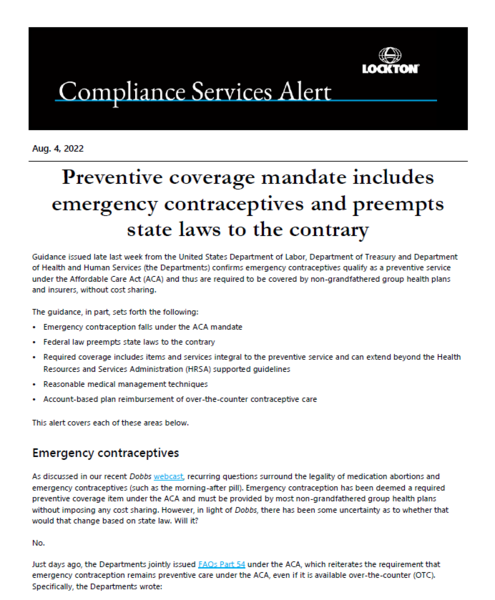Guidance issued late last week from the United States Department of Labor, Department of Treasury and Department of Health and Human Services (the Departments) confirms emergency contraceptives qualify as a preventive service under the Affordable Care Act (ACA) and thus are required to be covered by non-grandfathered group health plans and insurers, without cost sharing.
The guidance, in part, sets forth the following:
Emergency contraception falls under the ACA mandate
Federal law preempts state laws to the contrary
Required coverage includes items and services integral to the preventive service and can extend beyond the Health Resources and Services Administration (HRSA) supported guidelines
Reasonable medical management techniques
Account-based plan reimbursement of over-the-counter contraceptive care
This alert covers each of these areas below.
Emergency contraceptives
As discussed in our recent Dobbs webcast (opens a new window), recurring questions surround the legality of medication abortions and emergency contraceptives (such as the morning-after pill). Emergency contraception has been deemed a required preventive coverage item under the ACA and must be provided by most non-grandfathered group health plans without imposing any cost sharing. However, in light of Dobbs, there has been some uncertainty as to whether that would that change based on state law. Will it?
No.
Just days ago, the Departments jointly issued FAQs Part 54 (opens a new window) under the ACA, which reiterates the requirement that emergency contraception remains preventive care under the ACA, even if it is available over-the-counter (OTC). Specifically, the Departments wrote:
Consistent with the HRSA-Supported Guidelines and as clarified in previous guidance regarding coverage of OTC contraceptives, plans and issuers must cover without cost sharing
(1) emergency contraception (levonorgestrel), and
(2) emergency contraception (ulipristal acetate),
including OTC products, when the product is prescribed for an individual by their attending provider.
Plans and issuers are required to cover these products without cost sharing including when they are prescribed for advanced provision.
See FAQs Part 54, Q5.
The Departments also encourage plans and issues to cover emergency contraceptive products without cost sharing even when they are purchased without a prescription.
Federal law preemption and enforcement
Significantly, the FAQs provide that federal law preempts any state law which prevents the application of the ACA’s preventive care mandate.
Lockton comment: This is significant in light of Dobbs as states now have the authority to regulate reproductive health and abortion coverage. If a state restricting abortions deems the morning-after pill to be abortive and by legislative action attempts to restrict access to this emergency contraception, federal law will preempt the state law. Moreover, HHS may step in to enforce the ACA contraceptive mandate within that state.
Although states have primary enforcement over insurers with regard to the ACA preventive services mandate, including contraceptive coverage, the FAQs state that HHS will instead assume the enforcement responsibility if a state fails to enforce one of the mandate’s provisions.
Lockton comment: While the guidance does not apply to plans that have a religious or moral exemption from the mandate, the Departments are crystal clear that all other non-grandfathered plans and insurers must ensure they comply, remove impermissible barriers and ensure individuals have access to the mandated contraceptive coverage, or they may face investigations and possible penalties.
Required coverage
The FAQs address numerous contraceptive issues, including coverage of FDA-approved, cleared or granted contraceptive products even if not listed in the HRSA-supported guidelines, as long as the individual’s provider deems it medically appropriate.
Moreover, items and services that are integral to the furnishing of a recommended preventive service must also be covered without cost sharing. This includes, for example, tubal ligation procedures or pregnancy tests before using an intrauterine device.
The Departments encourage plans and issuers to cover an advanced 12-month supply of contraceptives, but it is not required.
The Departments were also immensely clear in stating that plans and issuers are required to cover FDA-approved emergency contraception when prescribed by an attending provider, even if available OTC.
Medical management techniques
The Departments have received numerous complaints of denied contraceptive care, some due to medical management techniques. The reasonableness of a medical management technique is based on all the relevant facts and circumstances.
Reasonable medical management techniques within a specified category of contraception may be used by plans and insurers only to the extent an HRSA guideline does not specify the frequency, method, treatment or setting for providing a recommended product or service.
Due to the number of complaints, the Departments set forth a non-exhaustive list of examples where medical management techniques would be deemed unreasonable:
Denying coverage for all or particular brand name contraceptives, even after the individual’s attending provider determines and communicates to the plan or issuer that a particular service or FDA-approved, cleared or granted contraceptive product is medically necessary with respect to that individual.
Requiring individuals to fail first using numerous other services or FDA-approved, cleared or granted contraceptive products within the same category of contraception before the plan or issuer will approve coverage for the service or FDA-approved, cleared or granted contraceptive product that is medically necessary for the individual, as determined by the individual’s attending healthcare provider.
Requiring individuals to fail first using other services or FDA-approved, cleared or granted contraceptive products in other contraceptive categories before the plan or issuer will approve coverage for a service or FDA-approved, cleared or granted contraceptive product in a particular contraceptive category.
Imposing an age limit on contraceptive coverage instead of providing these benefits to all individuals with reproductive capacity.
See FAQs Part 54, Q8.
Account-based plans
The FAQs also addressed account-based plans, specifically health FSAs, HSAs, and HRAs, and confirmed that these plans can reimburse the cost of OTC contraceptives as long as the cost is not also paid or reimbursed by another plan or coverage. However, if plans or insurers decide to cover such contraceptives without a prescription, they should also advise individuals not to submit any costs to the account-based plans as that would result in double dipping from a tax perspective, seeing as the participant could potentially be reimbursed on a pretax basis through the group health plan and then through the FSA, HSA or HRA.
Lockton comment: This issue was addressed because the ACA contraceptive mandate requires prescribed contraception to be provided without cost sharing through the non-grandfathered group health plan. However, plans/insurers may decide to expand on this and also allow OTC contraceptives (i.e., without a prescription) to be provided without imposing costs on the individual. So, for example, an employee seeking reimbursement from the group health plan in such a case cannot also seek reimbursement from their health FSA. Neither can this individual use their debit card if reimbursement will also be sought from the plan.
Conclusion and next steps
It is clear the Departments are ramping up their efforts to ensure compliance with the ACA contraceptive mandate amidst numerous complaints of plans, insurers and pharmacy benefit managers failing to follow the rules.
This guidance comes at a pivotal time when many employers and plans are reevaluating options in light of Dobbs. While the legality of abortion now falls to the various states, access to emergency contraception remains a required preventive care benefit under federal law.
Plans sponsors would be prudent to review their plans design with carriers, third-party administrators and pharmacy benefit managers to ensure they are familiar with and following these guidelines.
 Full alert (opens a new window)Not legal advice: Nothing in this alert should be construed as legal advice. Lockton may not be considered your legal counsel, and communications with Lockton's Compliance Services group are not privileged under the attorney-client privilege.
Full alert (opens a new window)Not legal advice: Nothing in this alert should be construed as legal advice. Lockton may not be considered your legal counsel, and communications with Lockton's Compliance Services group are not privileged under the attorney-client privilege.

